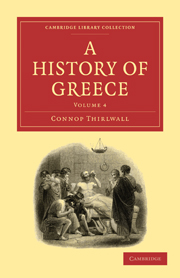Book contents
- Frontmatter
- Contents
- CHAPTER XXVII FROM THE CLOSE OF THE SICILIAN EXPEDITION TO THE BEGINNING OF THE RUPTURE BETWEEN THE SPARTANS AND ALCIBIADES
- CHAP. XXVIII FROM THE BEGINNING OF THE RUPTURE BETWEEN THE SPARTANS AND ALCIBIADES TO THE OVERTHROW OF THE FOUR HUNDRED AT ATHENS, AND THE RESTORATION OF ALCIBIADES
- CHAP. XXIX FROM THE OVERTHROW OF THE FOUR HUNDRED TO THE BATTLE OF NOTIUM
- CHAP. XXX FROM THE BATTLE OF NOTIUM TO THE END OF THE PELOPONNESIAN WAR
- CHAP. XXXI FROM THE END OF THE PELOPONNESIAN WAR TO THE REESTABLISHMENT OF DEMOCRACY AT ATHENS
- CHAP. XXXII RETROSPECTIVE SURVEY OF THE INTERNAL CONDITION OF ATHENS DURING THE PELOPONNESIAN WAR, CARRIED FORWARD TO THE RENEWAL OF HOSTILITIES BETWEEN ATHENS AND SPARTA
- CHAP. XXXIII THE EXPEDITION OF CYRUS THE YOUNGER
- CHAP. XXXIV THE RETURN OF THE GREEKS
- CHAP. XXXV FROM THE RENEWAL OF HOSTILITIES BETWEEN SPARTA AND PERSIA TO THE DEATH OF LYSANDER
- CHAP. XXXVI FROM THE DEATH OF LYSANDER TO THE PEACE OF ANTALCIDAS
- APPENDIX
CHAP. XXXI - FROM THE END OF THE PELOPONNESIAN WAR TO THE REESTABLISHMENT OF DEMOCRACY AT ATHENS
Published online by Cambridge University Press: 05 July 2011
- Frontmatter
- Contents
- CHAPTER XXVII FROM THE CLOSE OF THE SICILIAN EXPEDITION TO THE BEGINNING OF THE RUPTURE BETWEEN THE SPARTANS AND ALCIBIADES
- CHAP. XXVIII FROM THE BEGINNING OF THE RUPTURE BETWEEN THE SPARTANS AND ALCIBIADES TO THE OVERTHROW OF THE FOUR HUNDRED AT ATHENS, AND THE RESTORATION OF ALCIBIADES
- CHAP. XXIX FROM THE OVERTHROW OF THE FOUR HUNDRED TO THE BATTLE OF NOTIUM
- CHAP. XXX FROM THE BATTLE OF NOTIUM TO THE END OF THE PELOPONNESIAN WAR
- CHAP. XXXI FROM THE END OF THE PELOPONNESIAN WAR TO THE REESTABLISHMENT OF DEMOCRACY AT ATHENS
- CHAP. XXXII RETROSPECTIVE SURVEY OF THE INTERNAL CONDITION OF ATHENS DURING THE PELOPONNESIAN WAR, CARRIED FORWARD TO THE RENEWAL OF HOSTILITIES BETWEEN ATHENS AND SPARTA
- CHAP. XXXIII THE EXPEDITION OF CYRUS THE YOUNGER
- CHAP. XXXIV THE RETURN OF THE GREEKS
- CHAP. XXXV FROM THE RENEWAL OF HOSTILITIES BETWEEN SPARTA AND PERSIA TO THE DEATH OF LYSANDER
- CHAP. XXXVI FROM THE DEATH OF LYSANDER TO THE PEACE OF ANTALCIDAS
- APPENDIX
Summary
In the capitulation on which Athens surrendered, so far as its terms are reported by Xenophon, no mention appears to have been made of any change which was to take place in its form of government; and, if we might believe Diodorus, one article expressly provided, that the Athenians should enjoy their hereditary constitution. This is probably an error; but if such language was used in the treaty it was apparently designed rather to insult than to deceive the people; and the framers of the article, who were also to be its expounders, had in their view not the free constitution under which the city had flourished since the time of Solon, but some ancient form of misrule, which had been long forgotten, but might still be recovered from oblivion by the industry of such antiquarians as Nicomachus. It is at least not to be doubted that the Spartan government, if it did not stipulate for the subversion of the democracy, looked forward to such a revolution as one of the most certain and important results of its victory. But it may have believed that its Athenian partisans would be strong enough to effect it without its interference. And we gather from a statement of Lysias, which Xenophon does not contradict, that Lysander, after he had seen the demolition of the walls begun, leaving his friends to complete their work, sailed away to Samos, now the only place in the Ægean where the authority of Sparta was not acknowledged.
- Type
- Chapter
- Information
- A History of Greece , pp. 174 - 209Publisher: Cambridge University PressPrint publication year: 2010First published in: 1837



